ISLAMABAD: Legal difficulties restrained the government from keeping the petroleum products prices at a higher level and instead reducing the rates of electricity.
Sources said that amid declining world oil prices, the government considered cross-subsidising the electricity rates by keeping the prices of petroleum products at higher level, but finally it dropped the idea.
A senior cabinet member confirmed to Dawn that the proposal remained under discussion for some time among key cabinet members.
Earlier, a couple of the ministers had proposed that reduction in international oil market should not be fully passed on to consumers through product pricing and instead higher revenue should be diverted to cut electricity rates.
Under the proposal, the higher tax on petroleum products, like petrol, diesel and kerosene should be utilised to cut furnace oil prices with a big margin so that generation cost of power plants could be lowered.
They had argued that a partial reduction in prices of petroleum products, coupled with a cut in electricity rates, would go well with the general public that had been overburdened in the recent past because of substantially enhanced power rates, withdrawal of slab benefits and complaints of over-billing. However, Finance Minister Ishaq Dar and Petroleum Minister Shahid Khaqan Abbasi resisted the proposal.
While Mr Abbasi did not like the temptation of tempering with a long-practised and well-accepted oil pricing formula and highlighted many legal and operational hitches, Mr Dar was opposed to creation of a new sort of distortion in the power tariff.
“The proposal was not considered worth the effort,” a minister said.
The crux of finance minister’s line of argument was that power tariff required to be made more transparent by including all actual costs in its pricing instead of artificially keeping them on the lower side without actually knowing the exact size of system losses. Also, the tariff reform had taken a toll on government popularity leading to reduction of a gap between the cost of power generation and recovery and hence no more black holes should be created.
An official explained that the impact of larger reduction in oil prices was quite higher politically when compared with its translation into the power tariff.
A Rs10 per litre reduction in petrol or diesel is considered much higher compared to a reduction of a couple of paisas in power tariff, he said.
On top of that, furnace oil prices had also come down and had proportionate impact on power generation cost.
It was also argued that the only way the government could withhold oil price reduction was to impose a fresh surcharge.
It was not advisable given the government’s experience with the courts in the matter of gas development infrastructure cess and debt-servicing surcharge on power rates.
It was also explained that the government could not increase the petroleum levy on all oil products because it would require an amendment in finance bill through the parliament as the government was already charging maximum petroleum levy on all products as permissible under the existing laws in vogue.
A government official said the petroleum ministry was strongly opposed to any change in the existing oil pricing mechanism and wanted full impact of fall in oil prices in the international market passed on to consumers.
Apart from Rs6 to Rs14 per litre petroleum levy, the government is also charging 17 per cent general sales tax on prices of all oil products.
At present, the petroleum levy is at its maximum permissible limit under the law. The Federal Board of Revenue is anticipating Rs60 billion fall in its general sales tax collection on oil.
Published in Dawn December 4th , 2014
















































